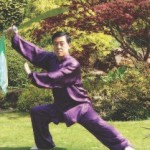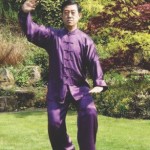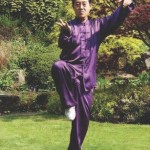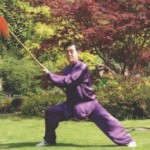By Dave Barrett, translated by Master Yang Jun
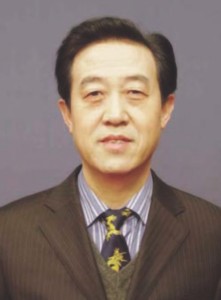
Master Chen Zhenglei was born in 1949 into a family with over 300 years of martial arts tradition. He is widely recognized as one of the leading exponents of Chen Style Taijiquan in the world today. His Uncle, Chen Zhaopei (1893-1972), was his main instructor along with another Uncle: Chen Zhaokui (1928-1981), the son of Chen Fa-ke. Chen Zhaopei left his home village, Chenjiagou, in 1914 and established himself in Beijing as a martial arts instructor. The story goes that he set up a platform at one of Beijing’s main gates and for seventeen days accepted all challenges, either single or multiple, and was victorious in every fight. Displaying his deep skills and magnanimous character in victory made his reputation and for the next 30 years he taught in a variety of places across China. In 1958 he returned to Chenjiagou to find the old training halls abandoned and his relatives engaged in a struggle to survive a series of natural and political disasters that had devastated the surrounding farmlands and reduced the villagers to a pitiful state. Recognizing that the future of his family’s illustrious traditions hung in the balance, he moved back to Chenjiagou and began to revive the training regimens that had produced so many generations of excellent martial artists. Persevering through famines and political upheavals gradually the next generation began to emerge under his careful guidance. Out of this group of students came “The Four Tigers of Chenjiagou”: Chen Xiaowang, Wang Xian, Zhu Tiancai, and Chen Zhenglei; all of whom have gone on to revive and expand the prestige of Chen Style Taijiquan.
When we were in Handan this past September, Master Chen Zhenglei was kind enough to sit down with myself and Yang Laoshi for the following conversation. I began by asking him about something we had seen on our recent trip to his ancestral village, Chenjiagou.
DB: I’d like to start by asking a personal question. Yang Laoshi told me that you used to be a farmer. When we were driving out to Chenjiagou yesterday, we were surprised to see all the roads completely covered with corn kernels drying in the sun. Did you work the corn harvest?
CZ: Yes!
DB: Is this done completely by hand?
CZ: Now we have some machines but when I was a farmer we did it completely by hand.
DB: So then it is spread out to dry?
CZ: Nowadays it is a little bit easier but they still dry the corn by hand and use it through the winter.
DB: How is it used?
CZ: We’d use it for food, also to brew alcohol, feed the chickens and pigs. Also corn is used as a material in medicine and it can be made into oil.
DB: The reason I ask is that at that time it must have been very difficult to work as a farmer and also train in Taijiquan.
CZ: Yes, I paid double than normal people in time, working as a farmer and training.
DB: So how did this work? Would you train early in the morning or after work?
CZ: Generally we would practice at night. The village schedule is different than working a factory job. At the factory your shift starts at 8am, we however had to rise at dawn, go out to the fields, work hard and then come back for breakfast. After breakfast again we would be out in the fields all day.
DB: So you would farm by day and train by night. Chen style is characterized by very tough and intensive training. Your generation had to work the fields and then endure this diffi- cult study. In spite of this Chen Style has maintained its high standard of excellence. Tell us how this has been accomplished.
CZ: My teacher, Chen Zhaopei, would tell us of his training experiences and his 30 years of teaching in different places. He gave me a lot of ideas about my practice. He’d look at our group and notice that some were not training quite so hard. He would tell us that these techniques were a treasure of our family passed through eighteen generations. If this transmission stopped with the nineteenth generation and could not go on, we will be ashamed to face our ancestors and we will also disappoint future generations. So everybody would be let down if we did not work hard. Because Chen Zhaopei spoke to us in this manner, our group, including me, felt a great duty. From a very young age I began to tell myself I must continue our family tradition. It doesn’t matter how hard the work is, how tired I may be, everyday I cannot stop. In the early 1960’s even we farmers had a hard time feeding ourselves. There was famine all across China. When I was young during those years many times we had not enough to eat: no meat, no flour for noodles. We ate wild vegetables and sweet potatoes. So my body couldn’t get enough nourishment. When I was thirty I weighed only 58 kg. (127 lbs.). Very skinny.
DB: In spite of this you continued to train and we can see clearly the results of your dedication when you perform today. My question concerns the next generation and international students as well, how should we dedicate ourselves to training?
CZ: Of course, because China’s situation has changed, not many people are willing to work this hard. On the one hand, I use the same methods as my uncle to encourage my students. I tell them about my training experiences. If I hadn’t worked this hard at Taijiquan I would probably still be a farmer. Now I travel all over the world and have many students. Also today we have many more convenient aids to our study: books and videos. It’s much easier to study than before. In the past, the training was limited to only males inside the family, very restrictive. My feeling is that all people should be taught openly. Before, these techniques were used to protect your life in a fight. Now it doesn’t matter how good you are, anyone can use just one finger to pull a trigger and kill you. Today this is a cultural art which I would like to share with the world. I meet many foreign students and I can see their love of Taijiquan and many wish to learn. I feel a duty to develop and share these traditional arts. In the past fifteen years I have had study materials translated into eight languages. My foreign students have helped with this work. What one teacher can do is limited, with these study resources the effect is greater, and anyone can buy them and study.
DB: I think no matter what language or culture, the student of Taijiquan is faced with a problem: if we practice by ourselves sometimes the practice can be very dry, empty of content. Can you offer any suggestions as to how we can make our practice richer, having more content and feeling of purpose?
CZ: What you have mentioned about other students, I also have this problem, this same feeling. We want to create an ongoing interest that leads to regular practice without stopping. At the beginning one learns the basic forms and motion sequences. At that time if you don’t have a good teacher to give you corrections and guidance it’s difficult to continue your development. It’s easy to drop out of the practice. On the other hand, with a good teacher this is less likely to happen. But if every day you practice in the same way it is natural to become bored. So what can you do? You can pick up your sword or saber, different weapons, practice a little push hands. If you eat the same meal every day you’ll lose your taste for that dish. When your teacher can lead you to the level where the external techniques are combined with internal intent, when the Qi can permeate the whole body, when you have that feeling, then with each practice there will be improvement. When this feeling improves with each practice you can spend less time with your teacher and more time in self study. It will be easier to continue because you have this feeling. Without this rich feeling during practice it is easy to lose interest and drop out.
DB: My first teacher always encouraged us by saying, “Catch the feeling!” Sometimes the feeling is there for just a small part of a sequence, but maybe with the next practice a little bit more.
CZ: In my experience with western students I know that sometimes they only practice once a week, sometimes twice or three times a week. Because they don’t practice every day this kind of feeling develops very slowly. In China we say that if you practice for one day you get one day’s benefit, with daily practice you can steadily improve. If you don’t practice for one day you lose ten days of development. So practice every day without stopping! Western students must understand this clearly. Practice every day! Not once or twice week.
DB: This is great advice. I don’t want to take too much of your time, but I do have one more question. When you practice today and you hear the voice of your teacher in your mind, what is he saying?
CZ: In my younger years when I practiced I was quite serious about my work. My whole life I have followed the teachings of my uncles, Chen Zhaopei and Chen Zhaokui. When they taught I always watched very carefully. At that time my deep feeling was that I wanted to grow up to be like them. I listened to their voices and watched their motions closely. A t that time there were no recorders or video cameras. My eyes were the camera and my mind was the recorder. If I needed to check something I would sit down, close my e yes and review. If I was not satisfied with my practice I would check my memories and think about my Uncles. Sometimes I would hear them criticizing my efforts, using r ough language to spur my practice onwards.
DB: So you still hear this?
CZ: Yes, even now when I may not want to practice I hear my Uncles’ voices pushing me, giving me energy to practice. It doesn’t matter what difficulties I’ve been through. In the 1980’s when I met people who wished to challenge me I’d hear my Uncles giving me confidence to win these challenges. Throughout my career I have been through five stages. Firstly, when I was a farmer up to the time I was 25 years old I was studying with my Uncles. The next ten years I was working in a factory while continuing my martial arts training. I was traveling around as a salesman and I made contacts with other teachers and I was able to benefit from these friendships and improve our factory sales. During these ten years I would often represent our village at competitions. The third stage found me working with national sports officials and I became a professional coach. I continued my training and began to teach a large number of students, some of whom won many competition honors. In the fourth stage I began to organize regional and national competitions. Now at the fifth stage I’ve got a job I really like, traveling internationally and sharing my family traditions. When I was living in Chenjiagou I focused on my own training and my individual duty to our family. At the second stage I began to travel and see that perhaps there might be a career in the martial arts. In the third and fourth periods because I met many other teachers and was working as a player, coach and manager, I began to realize this could be a very good family business as well. Now that I travel internationally meeting many people who have a love of this art, now my focus is on how we can spread Taijiquan. I’ve been working on books and videos and I feel a true calling to this work, it is more than just a business. I’ve been fortunate to receive recognition within China as one of the top ten Masters and I’m getting a lot of support from my students and no longer have to work a factory job.
DB: Let me close by saying I think your career may have come a full circle. Again you are a farmer and you are planting seeds around the world and cultivating your family’s art. I predict that you will have a rich harvest!
CZ: Now that China is open I wish to spread traditional Chinese arts throughout the world so that more people can enjoy Taijiquan practice. ☯
Reprinted from Journal 25 10th Anniversary Issue

